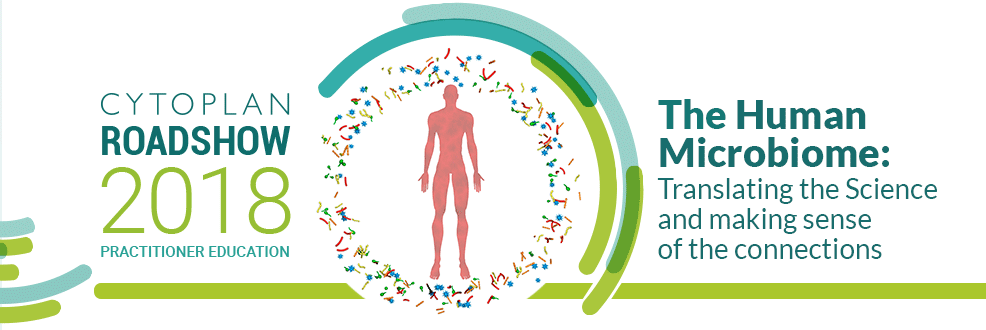Your gut microbiota sits at the centre of a complex web of cables that connect all systems in the body, including your nervous system (and your brain as part of it), your immune system, your cardiovascular system, and even your skin. Indeed, it is now a well known fact that the health of your gut has a huge impact on your overall health and well-being.
In this week’s blog, nutrition practitioner Miguel Toribio-Mateas provides an introduction to the role of your gut flora in health and disease. Miguel is currently looking at the relationship between gut flora and cognitive decline as part of his doctoral research at Middlesex University. This blog is part 1 of a series of 3.
Miguel will be speaking about the gut microbiome at our roadshow events throughout 2018, you can find out more about the roadshow, including booking information, by clicking here.
Gut flora – the gatekeeper of your health?
Trillions of bacteria live in your gastrointestinal system. Think of the gut as an ecosystem akin to a garden. And just like your garden hosts a variety of plants, from weeds to beautiful fruit-bearing trees, and provides cover for a number of animals, your gut flora isn’t only made up of bacteria but also of yeast and other organisms like parasites which are in constant flux. Some come and go, some stay all the time, colonising your gut but varying in numbers according to the foods you eat.
Emerging science also points to how the types of microorganisms that inhabit your gut may change depending on any medical conditions you may suffer from, e.g. irritable bowel syndrome (IBS), diabetes (type 2) or chronic fatigue syndrome.
In fact, obesity, diabetes (type 2), and inflammatory bowel conditions such as Crohn’s and Ulcerative Colitis (known as IBD, where D stands for “disease”) are characterised by reduced microbial diversity. Going back to that garden analogy, having lower microbial diversity could be seen as having a garden where most of your plants are the same. They could be healthy plants, but the garden wouldn’t be terribly exciting, so it wouldn’t attract a variety of insects, snails, frogs or birds wanting to live in it. So when the microbial diversity of your gut is low, a narrower spectrum of beneficial substances, like short chain fatty acids, is produced. These are molecules that your gut bacteria produce when you eat fibre-rich foods.
But your gut is not like Vegas. What happens in the gut, doesn’t stay in the gut. These short chain fatty acids are taken to other organs by the blood and can affect the health of a whole bunch of body systems. And if you think that food can either be fertiliser or a super powerful weed killer for the garden that is your gut, you hold the power to either feed or poison that ecosystem every time you have a meal.
I often see us as cavemen and cave women living in a sci-fi world. We still share 99.9% of the genetic characteristics of our primal ancestors, but we’re living a modern lifestyle that our gut microbiota has a hard time adjusting to, and this can contribute to disease development.
A noteworthy example of how food choices can have a dramatic effect on your gut “microbiota” (the technical term given by scientists to the whole community of microorganisms that inhabit your gut: bacteria, yeasts, parasites, worms, etc.) is the use of artificial sweeteners and emulsifiers, both of which have the potential to diminish microbial diversity, as well as to increase intestinal inflammation and contribute to the development of metabolic syndrome.
By contrast, tribes of wandering foragers called Hadza, living in Western Tanzania, eat a diet of roots, berries, and game. These modern-day hunter–gatherers have some of the highest microbial diversity on record for any population in the world. Perhaps it is not surprising that they don’t normally need to take antibiotics, some of the most intensely disrupting substances for the microbial ecosystem. And perhaps because of that too they have immune systems and livers that are very resilient and allows them to be exposed to a lot more dirt than a Westerner without getting ill.
A beautiful garden as a centrepiece of a complex web of interactions
Your gut microbiota sits at the centre of a complex web of cables that connect all systems in the body, including your nervous system (and your brain as part of it), your immune system, your cardiovascular system, and even your skin.
The types and numbers of microbes living in your gut have a profound role in the development of the lymphatic (or lymphoid) tissue that is part of the immune system in the gut. Depending on how diverse your gut bacteria are your immune system will be more or less likely to be constantly “on guard”. In fact, there are distinct changes in gut flora in autoimmunity, and those with autoimmune conditions can benefit the most by nourishing the gut with a wide spectrum of brightly-coloured, fibre-rich plant foods that are likely to promote microbial diversity.
Your gut microbiota also affects the development and maintenance of a healthy gut-endocrine (enteroendocrine) system. In fact, having a good spread of bacteria in your gut has been shown to make you more sensitive to insulin, the hormone that manages blood sugar levels. And being more sensitive to insulin can only be good, as having too much of it pumped into your blood on a regular basis can be one of the contributing factors to diabetes (type 2) as well as to overweight and obesity. That’s why finding out about the types of microbes that inhabit your gut, as well as in what quantities, can be very useful.
A stool sample produced at home and sent to a lab where it’s analysed by latest generation sequencing – a process whereby bugs are identified by matching their DNA to that in a database – generates highly specific results that can arm a practitioner who is used to dealing with these facts in clinical practice with evidence on the state of your gut upon which to issue individualised recommendations. I have used these types of tests for the best part of 10 years and have seen 100s of people who’ve experienced positive changes as a result.
Why would anyone want to have a stool test? What is that good for?
Commensal Bacteria
Most people tend to think of stool or “poo tests” as something you’d have when you suffer from gut issues. But, as I mentioned previously, gut matters don’t just stay in the gut. So you don’t necessarily need to experience bloating, constipation, diarrhoea or anything in between to benefit from knowing more about the bacteria that live inside you, as well as some of the molecules that they produce. In this first part of the series, I’ll just talk about this thing called “commensal bacteria”.
This name refers to 24 major bacterial types (genera or species) that are part of 7 major umbrella groups (phyla). These bacteria are called commensal because they have a symbiotic relationship with us humans. They share and exchange metabolic functions, contributing to our health or to our developing various diseases. That’s why a growing body of scientific evidence suggests that the makeup and metabolic functions of these commensal bacteria are essential to maintenance of human health and wellbeing.
Certain types of bacteria, like a cute little bug called Akkermansia muciniphila, are more readily seen in those people who are able to keep a lean body with less fat and more muscle. That’s why it’s been dubbed “the skinny microbe”. Akkermansia loves not only fibre, but fibrous foods that are rich in polyphenols, natural substances that are normally present in brightly coloured fruit and vegetables. Akkermansia loves polyphenols from pomegranates and red berry-type fruits, like cranberries and red grapes. You are endowed with these keys that open the locks in nutrients so that you get them freed into your system and you can feed on them. These keys are called enzymes.
Microbes like Akkermansia have got their own keys that enable you to get access to nutrients that you could have never got access to as a human, so that’s the exchange that the lovely Akkermansia is engaging with you on as a thank you for feeding it some juicy pomegranate seeds. This is the kind of more sophisticated course of action you would be able to follow if you knew that your Akkermansia levels were low and you wanted to lose body fat, and just one of the many examples of how you could use knowledge about your gut flora to your advantage.
Will probiotics help?
If you’ve had a stool test recently and your microbial diversity came back as “low” there’s a chance that you could be more prone to develop overweight, obesity and metabolic disease. You may think that the solution is to take high dose probiotics? Well, you may be right, but also you might be wrong.
The gut is a bit like a forest with lots of different animals living in it. Imagine your forest was fairly thin on all types of animals, and that you release a whole load of squirrels into it. That would be the equivalent of taking a high dose probiotic with 1 single strain. Probiotic products that have a wider variety of strains would be more like releasing a few squirrels, a few wolves, a few blackbirds and a selection of insects into your forest, so it’d be more of a balanced repopulation.
Everyone’s needs will be slightly different, which is why if you want get highly specific it’s always best to test. Otherwise, ensuring you have plenty of high fibre foods such as onions, leeks, cabbages, etc. as well as polyphenol-rich fruits will help boost your bacterial diversity, and this will happen over time. Food-based probiotics like kefir and kombucha will also help most people, although if you’re very sensitive to fermented foods and/or have histamine metabolism issues (you will know if that’s the case), then go easy of these or work with a nutrition practitioner who knows how to manage these.
Nourishing your gut bacteria is even more important if you know that your fasting blood sugar levels and/or fasting insulin are a little too high, if there’s a sign of inflammation in your recent blood results, e.g. high C-reactive protein, or if you’ve been told your “bad cholesterol” is too high. Some readers may even tick these 3 boxes, and if that is you, then it’s even more important yet to make sure your gut flora is healthy and thriving, because healthy blood sugar, inflammation and cholesterol control all depend on having a good spread of healthy bacteria in your gut.
Some changes are easy. For example, if you’re a bread or rice eater, making a simple switch from regular bread to whole-grain barley, or from white rice to brown rice could result in an increase in the number of microbes in some of the families that have been seen to lead to improvements in metabolic dysfunction in humans, such as those in the Roseburia, Bifidobacterium and Dialister families. And if you had a family history of cardiovascular disease, you could do well eating blueberries regularly.
Why? Well, because this polyphenol-rich fruit is known to significantly increase numbers of the probiotic Bifidobacteria Longum infantis, which is known to possess anti-inflammatory activity and to regulate your immune system.
In Part 2 I’ll be digging a little deeper into the gut and exploring connections with other body systems that you may not have thought about before, but that scientists have been documenting for years.
Final thoughts
Treating every meal as an opportunity for a “therapeutic treatment” and every food as a potential drug can be a very powerful way to view food. My advice is to do so without obsessing, because life is long enough to try things out, but also short enough so it’s important to have a little bit of whatever you fancy. It is good for the soul, and pleasure is part of what enjoying food and being human is all about.
Being armed with information about your gut flora can help you develop a more precise plan of action that is even more powerful than a generic one that doesn’t take your own and your bacterial individuality into account. Working with food is so safe that you can’t go wrong. Hope you enjoyed reading this as much as I enjoyed writing it. Please stay tuned for my next blog on the funky molecules that your gut flora produce and that contribute to your health and wellbeing.

Miguel is a doctoral researcher in cognitive ageing who’s experienced the research process from the laboratory bench – having completed a lab-based Masters in Clinical Neuroscience focusing on brain ageing – to the delivery of science findings in the consultation room, delivering quality individualised nutrition care to his clients from 2009. Miguel’s background includes 15+ years in senior training roles in life sciences and medical publishing, and he has trained scientists and researchers around the world.
Cytoplan Roadshow 2018 – Early bird tickets available now!
Following the success of our practitioner education roadshow in 2017, we’re back this year with a different subject. With the amount of science being published on gut health and the gut microbiota, we thought we’d travel the UK and Ireland focusing on how to make sense of the human microbiome.
Nutrition practitioner and doctoral researcher in clinical neuroscience Miguel Toribio-Mateas will be translating complex science into simple but powerful clinical interventions. To find out more about the roadshow, and to book your place, please follow this link.
With many thanks to Miguel for this blog; if you have any questions regarding the health topics that have been raised, please don’t hesitate to get in touch with Clare via phone; 01684 310099 or e-mail clare@cytoplan.co.uk
Last updated on 14th February 2018 by cytoffice




Such a well written article using the analogy of the garden, which gives an easy to understand picture. This will be of huge benefit to the lay person.
Fantastic simlified information. Great analogies to make it easier to follow. Thankyou. Any suggestions for the best overall Probiotic I recently had salmonella in June and now just recovering from pneumonia x
Hi Amanda,
You may like to try Acidophilus Plus
For more personalised advice, we offer a free appraisal of your health, together with advice on lifestyle, diet and supplements via our health questionnaire. Please follow this link to the questionnaire if you would like to take advantage of this service
Kind regards,
Jackie
Love your analogy! May I use this to send to my clients. If it’s ok, do I reference you and cytoplan or just you? I have a practitioner account with cytoplan.
Many thanks
Fiona Ogilvy-Wedderburn
Hi,
You are more than welcome to provide your clients with a link to our blog page, or print the article and share it with them.
Many thanks,
Kate
Do you do the stool tests yourself
Hi Sara,
Unfortunately we don’t offer a stool testing service. However, Nutritional Therapy Practitioners may be able to offer this service as part of a nutritional consultation. To find a BANT registered Nutritional Therapy practitioner in your area, please visit: http://bant.org.uk/bant/jsp/practitionerSearch.faces
Kind regards,
Jackie
Fab article, good balance of information along with some great analogies, I love the garden, but anyone who can get away with writing ‘your gut is not like Vegas’ has my vote!
Lovely article. Thank you.
It was good to see the connection between the Lymph and the gut bacteria that produce the Lymph. I knew that both were important to our Immune systems, but this makes the link clearer.
What do we do if we wish to have a stool test?
Hi Vivienne,
Unfortunately we don’t offer a stool testing service. However, Nutritional Therapy Practitioners may be able to offer this service as part of a nutritional consultation. To find a BANT registered Nutritional Therapy practitioner in your area, please visit: http://bant.org.uk/bant/jsp/practitionerSearch.faces
Kind regards,
Jackie
Fantastic article thank you I have read a lot on gut flora and this is one of the most balanced and helpful. I love the analogy too particularly as it relates to probiotics and having an individual approach.
Excellent article – easy to read and to understand how important it is to eat healthily. Comparing our guts to a garden instantly helps to picture what might be going on inside us along with the diversity of each individual. I look forward to reading more.
I found this very interesting particularly as I have ME. I would love to know what you might recommend to help my gut flora that might give me some more energy?
Hi Anne,
Thanks for your question on our blog. If you could please send me an email (clare@cytoplan.co.uk) with a little more information – for example what supplements you are taking already, your current symptoms (including gut symptoms), any medical diagnoses (I note you mention ME, any others?) and any prescription medications, then I will be able to help.
We would usually recommend a multivitamin/mineral as a foundation (with good levels of B vitamins, which are important for energy production). In terms of specific gut support products, we have a number of products that you might like to consider, including a new product called CytoProtect GI Tract. This is intended for short to medium term use under the guidance of a practitioner and if you email me I can give you further advice. Alternatively you can complete a health questionnaire – this is a free service. If you complete and return a health questionnaire we will send you some diet and supplement recommendations.
Best wishes,
Clare